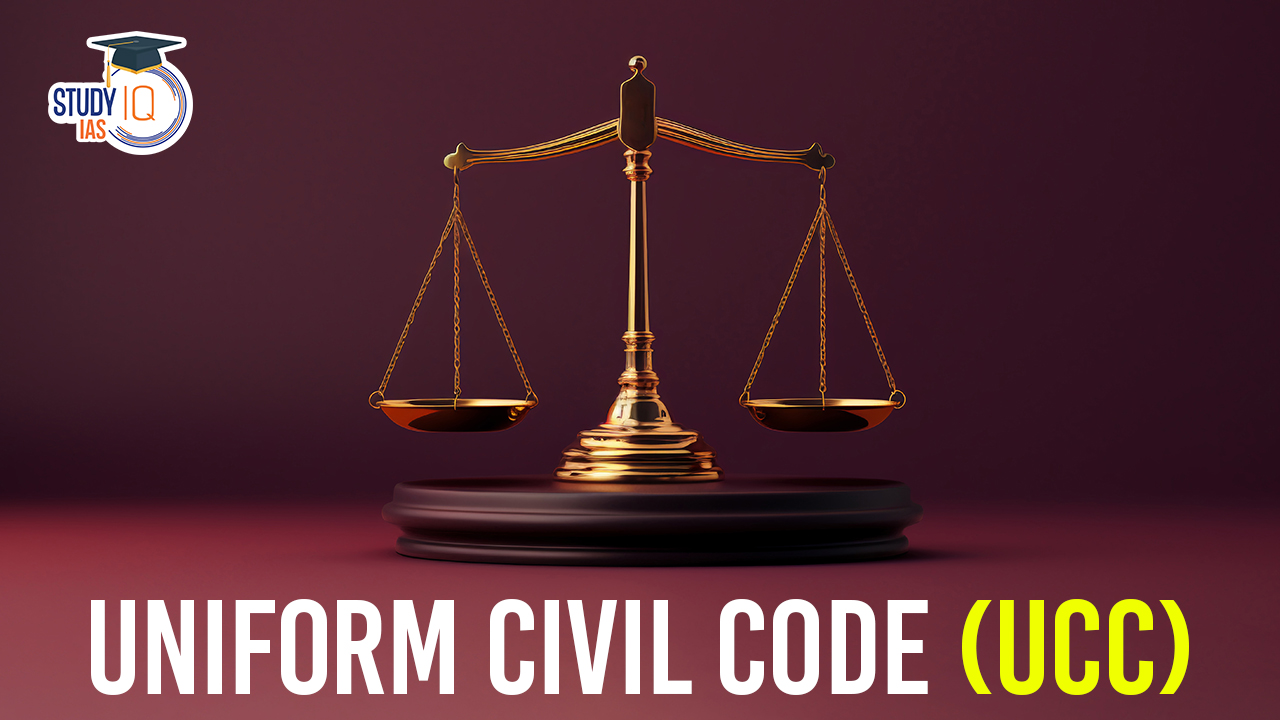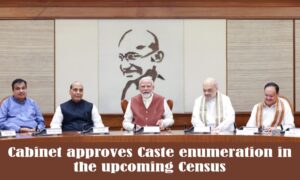Table of Contents
Uniform Civil Code: An Overview
- It aims to replace the diverse personal laws based on religious scriptures and customs with a common set of laws governing every citizen.
- These laws would cover marriage, divorce, adoption, inheritance, etc., promoting national unity and ensuring gender equality.
- The initiative is rooted in Article 44 of the Indian Constitution, which is a Directive Principles of State Policy, emphasising the state’s role in securing a UCC across India.
The word “Uniform Civil Code” is clearly included in Part 4, Article 44 of the Indian Constitution. In this article, we will discuss the Uniform Civil Code which will is an important topic of the Polity Subject of the UPSC Syllabus.
Assam Repeals British-Era Muslim Marriage Law
On February 23, 2024, the Assam cabinet of India declared its intention to repeal the outdated Assam Muslim Marriages & Divorces Registration Act of 1935. Enacted during the British colonial era, this act permitted marriage registration for individuals below the legal age of marriage, with girls as young as 18 and boys as young as 21. Led by Chief Minister Hemant Biswa Sarma, the Assam government’s decision aligns with its commitment to implement a Uniform Civil Code.
This move marks a significant step towards modernizing and standardizing civil laws, ensuring equal rights and protections for all citizens, regardless of religion or gender. By repealing this archaic legislation, the government aims to promote gender equality, safeguard the rights of minors, and foster a more inclusive and progressive society in Assam.

Debate in Constituent Assembly: UCC as Fundamental Right or Directive Principle
- Naziruddin Ahmad argued it might conflict with the freedom of religion (Article 19/now Article 25) and needed community consent.
- M. Munshi countered, stating a UCC wouldn’t violate freedom of religion and could benefit women’s equality by eliminating discriminatory practices.
- B.R. Ambedkar suggested a “purely voluntary” UCC initially, not imposing it on all citizens.
- The 5:4 majority vote by the fundamental rights sub-committee, led by Sardar Vallabhbhai Patel, decided against categorizing UCC under fundamental rights.
Uttarakhand UCC Initiative
Uttarakhand Assembly set to pass Uniform Civil Code bill, fulfilling State government’s election promise. Bill drafted by a state panel, approved by the state cabinet.
- In June 2022, Uttarakhand’s government, led by Mr. Dhami, took steps towards implementing a UCC by forming an expert committee headed by Justice Ranjana Prakash Desai.
- Despite the extension of deadlines, a draft UCC focusing on gender equality and the abolition of discriminatory practices was prepared.
Expected Changes in Uttarakhand UCC
- The proposed UCC in Uttarakhand aims to ensure equal treatment of men and women, especially in matters of inheritance, marriage, and divorce.
- It seeks to abolish practices like polygamy, iddat, and triple talaq, and proposes equal property rights for Muslim women, contrary to the current 25% share.
- Additionally, it mandates the registration of live-in relationships without altering existing rights related to reservations, marital customs, etc.

Supreme Court’s Stance on Uniform Civil Code
- Legislative Domain: It has consistently maintained that the implementation of a UCC is the exclusive domain of Parliament, not the judiciary.
- Historical Observations: In Shah Bano Begum case (1985), the Court called for the implementation of UCC. Such a demand was reiterated in subsequent cases such as Sarla Mudgal versus Union of India (1995), and John Vallamattom versus Union of India (2003) among others.
- State Authority: The Supreme Court highlighted that states like Uttarakhand have the authority to form committees for such purposes, as per Article 162 of the Constitution.
- Legislative Process Emphasis: The Supreme Court emphasises that UCC deliberations should occur within the legislative framework, respecting the separation of powers.
Law Commission’s Views on UCC
- The 21st Law Commission of India (headed by former Supreme Court judge Justice Balbir Singh Chauhan) deemed a UCC unnecessary and undesirable in 2018, suggesting instead amendments to discriminatory practices within personal laws.
- The 22nd Law Commission headed by Justice (Retd) Rituraj Awasthi issued a notification to elicit views from various stakeholders — including public and religious organisations — on the UCC.
Future Prospects for UCC
Following Uttarakhand, other states like Madhya Pradesh and Gujarat have initiated steps towards a UCC. The central government’s stance remains cautious, possibly awaiting outcomes from these states. The 22nd Law Commission’s report and ongoing Supreme Court deliberations on religious freedom will influence the path forward for a UCC in India.
If you want to know about the Meaning, History, Need and Historical cases related to Uniform Civil Code in detail then read the given information below.
Uniform Civil Code Meaning
The word “uniform” refers to rules that apply equally to all residents regardless of their sexual orientation, gender, or affiliation with a particular religion. According to a national civil code that applies to all equally, a uniform civil code indicates that all segments of society, regardless of their religion, will be treated similarly. “The State shall Endeavour to secure for the Citizens a uniform civil code throughout the Territory of India,” reads Article 44 of the Indian Constitution. UCC stands for Uniform Civil Code in full. The Common Civil Code is mentioned in Article 44 of the Constitution.
Uniform Civil Code History
India’s colonial era saw discussions of a uniform civil code. As a result, it has a long history and got its start when the British government submitted a report in 1835 calling for the codification of Indian laws in a standard manner to facilitate the administration of justice. Prior to independence (during the colonial era), criminal laws were codified and made universally applicable. While the personal laws were still governed by several community-specific ordinances.
The Indian Constitution was written during the Post-Colonial period (1947–1985). The opposition from religious fanatics and the uninformed masses was a major factor in the notable leaders’ campaign for a uniform civil code. The Hindu Code Bill, Succession Act, Hindu Marriage Act, Minority and Guardianship Act, and Adoptions and Maintenance Act, to name a few, were some of the reforms that were implemented at that time.
Also Read: Pressure Group
Uniform Civil Code and Historical Cases
The origins of UCC date back to the 19th century, when the country’s leaders emphasized the necessity for uniformity in the codification of Indian law with regard to crimes, evidence, and contracts but particularly advised against codifying the personal laws of Hindus and Muslims. Dr. B.R. Ambedkar had mixed feelings on the matter and believed that UCC was merely a suggestion rather than an imposition. “I do not think that the time is ripe in India at the present moment for me to try to push it through,” Pandit Jawahar Lal Nehru stated. Check the cases related to UCC below:
Shah Bano Case
The Shah Bano case, also known as Mohammad Ahmed Khan v. Shah Bano Begum, was brought before the Indian Supreme Court for the first time in the year 1985. The court instructed Parliament to draught a Uniform Civil Code in connection with the case. Shah Bano’s case was about obtaining maintenance money from her husband after she had triple talaq in accordance with Section 125 of the Code of Criminal Procedure.
The Muslim Women (Right to Protection on Divorce) Act of 1986, however, allowed the government to overturn the judgment in her case. According to this Act, a Muslim woman was not permitted to request maintenance under the earlier Act. By 2017, Triple Talaq, also known as talaq-e-bidat in the community, had been declared unconstitutional and illegal.
Sarla Mudgal vs Union of India
The Sarla Mudgal Case, which raised the issue of bigamy and disagreement over marriage-related issues within the current personal laws, was another significant case that gained attention. The Hindu Marriage Act of 1955 states that just one of the grounds enumerated therein may be used to dissolve a Hindu marriage that has been solemnized in conformity with Hindu law, according to the court. Since the Hindu marriage is not immediately void under the law, a second marriage that is solemnized after converting to Islam would be prohibited under section 494 of the Indian Penal Code (IPC).
Also Read: Right to Information Act
Uniform Civil Code in India
According to a national civil code that is uniformly applied to everyone, all social classes, regardless of their religious affiliation, must be treated equally. They address topics like marriage, divorce, child support, inheritance, adoption, and property succession. It is predicated on the idea that in contemporary culture, there is no relationship between religion and the law. According to Article 44, which is consistent with the Directive Principles of State Policy, the State shall make every effort to offer its citizens a uniform civil code (UCC) over the whole territory of India.
Uniform Civil Code Need
A Uniform Civil Code is important for uniting the nation because it is full of a variety of different religions, cultures, and practices. The same objective was accomplished by independence, but the uniform civil code offers far more benefits. To bring all Indians from various castes, faiths, and tribes under one roof, a single national civil code of behaviour will be observed. With no form of prejudice and everyone feeling like one, equality would be the rage. By upholding the straightforward legal system that would benefit everyone, this would increase humankind’s power and greatness and make the nation much stronger.
The concept of a uniform civil code meant that all citizens would be subject to the same set of rules, regardless of their gender, sexual orientation, or religion they practice. This is due to the fact that most personal laws are founded on the religious texts and other materials of many communities, which greatly divides society. Therefore, adherence to a single common law was required under the unified civil code, regardless of one’s membership in a particular community or their choice of religious practice.
Uniform Civil Code Benefits
- National Integration and Secularism: UCC will encourage secularism and national integration by giving all citizens a shared identity and sense of belonging. Additionally, it would lessen intercommoned and interreligious disputes brought on by various personal laws. It would uphold the constitutional principles of inclusivity, equality, and fraternity.
- Gender Justice and Equality: UCC will ensure gender justice and equality by eliminating the prejudice and repression that women experience as a result of many personal laws. In terms of marriage, divorce, inheritance, adoption, maintenance, etc., it would provide women the same rights and status as males. It would also provide women the power to fight against patriarchal and backwards-looking practises that violate their fundamental rights.
- Simplification and Rationalisation of the Legal System: By reducing the complexities and ambiguities of many personal laws, UCC will rationalise and simplify the legal system. By addressing the inconsistencies and gaps caused by disparate personal laws, it would reconcile the civil and criminal codes. The general public would have easier access to and comprehension of the law as a result.
- Modernisation and Reform of Outdated and Regressive Practices: The UCC would update and modernise the archaic and backwards practises that are common in several personal laws. It would end practises like triple talaq, polygamy, child marriage, etc. that are against the human rights and values established in the Indian Constitution. Additionally, it would take into account peoples’ evolving social realities and desires.
Uniform Civil Code in India Challenges
By upholding a single set of rules, the Uniform Civil Code brought people together, but many felt that it infringed their fundamental rights because it went against what was recognized as a component of such rights.
Constitutional Challenges
The equality right and the freedom of religion are at odds. The fundamental right to practice one’s religion is established by Article 25. Each religious denomination’s or section’s right to “conduct its own business in religious matters” is safeguarded under Article 26(b). Article 29 defines the right to preserve distinctive cultures.
Equality before the law is promised by articles 14 and 15 and these rights are irreconcilable. Additionally, according to Article 25, a person’s right to practice their religion is constrained by “public order, health, and morals.” The Uniform Civil Code is neither essential nor desirable at this time, according to a 2018 report by India’s Law Commission. The Commission contends that secularism and the nation’s diversity cannot be irreconcilable.
Social-Political Challenges
Minorities worry that, in the name of uniformity, the culture of the majority will be imposed upon them. It will be extremely difficult to bring all of these individuals together given the vast cultural variety of India. The adoption of the Uniform Civil Code is challenging because of the patriarchal outlook of Indian society. This may be observed in the fact that Hindu women only inherit a portion of the land to which they are entitled despite the Hindu Code Bill has been in place since the middle of the 1950s.
Uniform Civil Code UPSC
Hindu, Muslim, Christian, and Parsi personal laws have been codified in India in a distinctive synthesis. There isn’t a single family law applicable to all Indians in a single statute book that is accepted by all of the coexisting religions in India. The bulk of them, however, concur that UCC is undeniably desirable and would greatly aid in the development and stabilization of Indian nationhood. There are divergent views regarding when and how it should be adopted. Students can read all the details related to UPSC by visiting the official website of StudyIQ UPSC Online Coaching.


 Cabinet Approves Caste Enumeration in th...
Cabinet Approves Caste Enumeration in th...
 Arbitration in India, Types, Benefits, R...
Arbitration in India, Types, Benefits, R...
 Revised Detention Policy Implemented by ...
Revised Detention Policy Implemented by ...





















